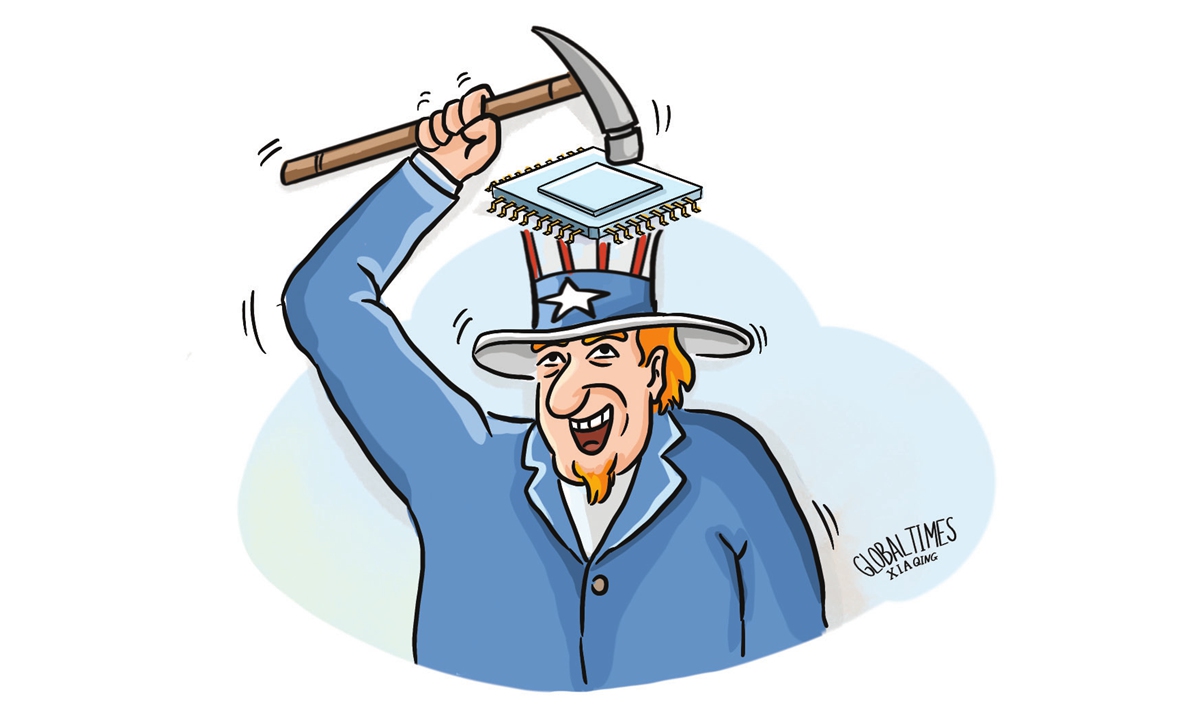
Illustration: Xia Qing/GT
In a recent New York Times article (published on October 21) analyzing the new US chip strangulation strategy against China, two words are used. The first appears in the headline, "Biden Just Clobbered China's Chip Industry." The English dictionary explains the word "clobber" as "defeat decisively or strike heavily."Another word, "devastate," appears in the text, "Analysts I spoke to said the rules will devastate China's domestic chip industry, potentially setting it back decades." This word is often used to describe the tragic aftermath of war, "to lay waste; render desolate."
If we use the two words judging the reality and future of US-China relations, we will immediately think about "a war." It's a war without artillery fight.
What we generally understand is that the Biden administration seeks to secure its dominance in this global high-tech frontier through a chip strategy.
How this advantage is maintained and continued is probably the core. One of the most important strategic arrangements is to "devastate" China's chip and its related industries.
There is no cooperation, no win-win, only a blockade and "zero-sum" results. This is not containment, but strangulation.
For high-end technology, one of the main drivers of China's future development, this is a real war.
Some American scholars have likened this to the oil embargo imposed on Japan by the US before the Pacific War. The metaphor here is that this could lead China, like Japan, to eventually go to war against the US. The logic of such an analysis is consistent with the US experience and historical view of empire and hegemony.
So far, China has not taken any strong countermeasures. What China has been emphasizing is to further strengthen its independent research and development, to break through the US' blockade with the spirit of self-reliance and hard work, and to concentrate its superior "forces" to move to the top of high technology.
China's policy is based on having a large-scale, all-round, multi-level manufacturing system, which also includes an industrial and scientific research base to advance to high-end chip technology.
Washington's introduction of a chip strategy has either intentionally or unintentionally ignored the laws that lead the development of the chip industry, as well as more high-tech fields. The US itself has also possessed a relatively large scientific research and industrial base to achieve high-end breakthroughs. This is mainly achieved on the basis of independent forces. Why is it possible for the US to succeed, but not for China?
Of course, the US control of chip exports and their equipment and technology to China will slow down China's breakthrough to the high-end. But that's a "slow down," not a collapse.
China is not without room to fight back. I'm afraid it's not just US companies that will lose a large market that allows them to reap huge profits. Given so many Americans use mid-range and high-end products containing "Made in China," if they are now to be without Chinese technology and manufacturing, can these products, including Apple phones, be produced properly?
Remember, even American warplanes have parts that are made in China. This gives China enough space to design and operate a strong counterattack.
As for comparing China to World War II Japan, that would be a fundamental strategic mistake. The 20th National Congress of Communist Party of China clearly stated to the world China's basic foreign relations policy. China will never claim hegemony and never expand.
It is not that some people in the West are not aware of the logic of China's peaceful development. The reason why they will always use the old rhetoric to exaggerate China's aggressiveness out of nothing is fundamentally the creation of public opinion by capitalist forces in order to stifle China and hold on to its possession of the global market (including the seizure of the Chinese market).
The biggest thing the US forgets is that they are "fighting" against a country with a strong industrial base, and that the two countries are so deeply connected in the industrial and trade chains. If it wants to "destroy" China, even in just one or two industrial areas, first of all, get ready to be hit back.
The author is a senior editor with People's Daily, and currently a senior fellow with the Chongyang Institute for Financial Studies at Renmin University of China. [email protected]. Follow him on Twitter @dinggangchina




















